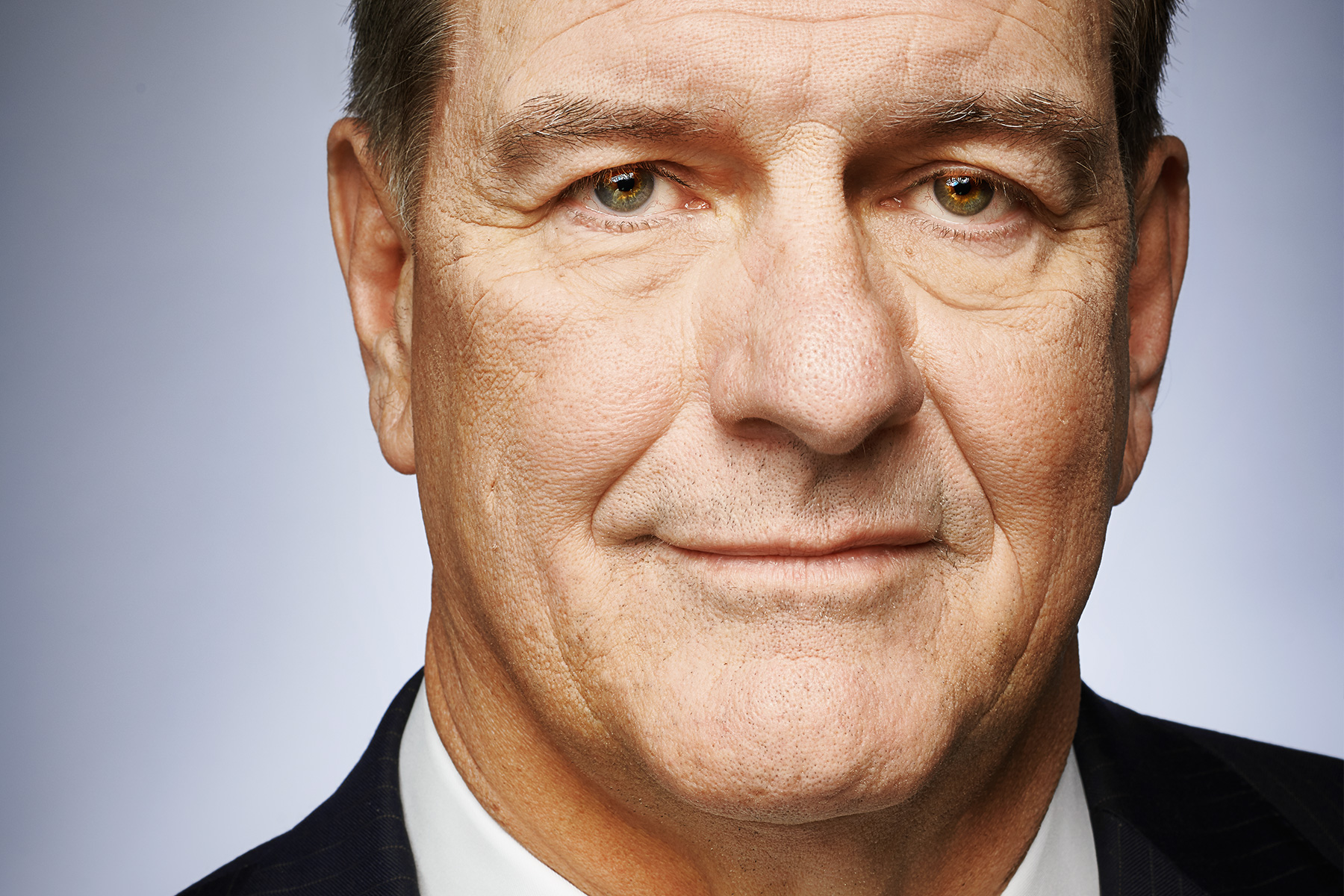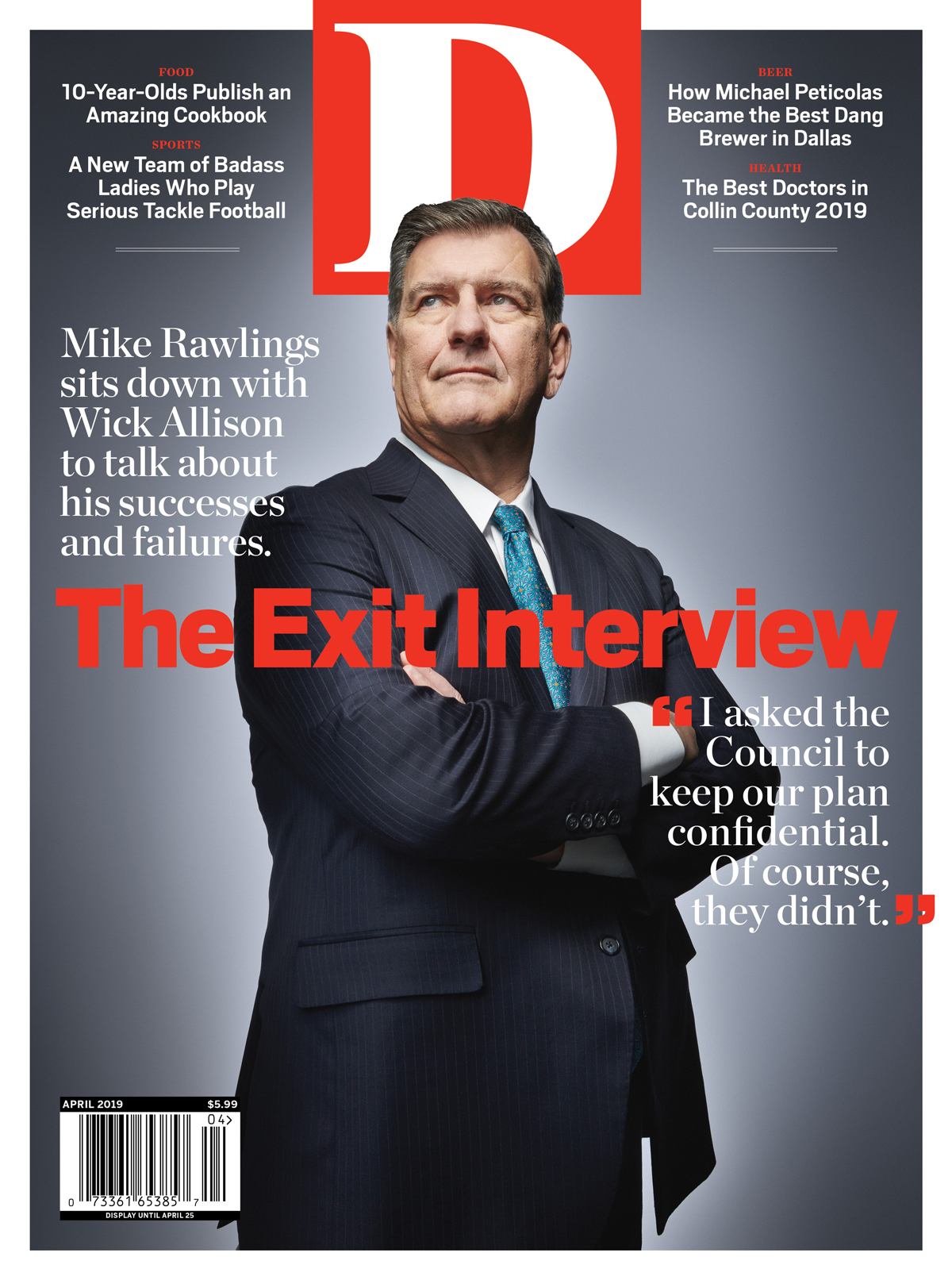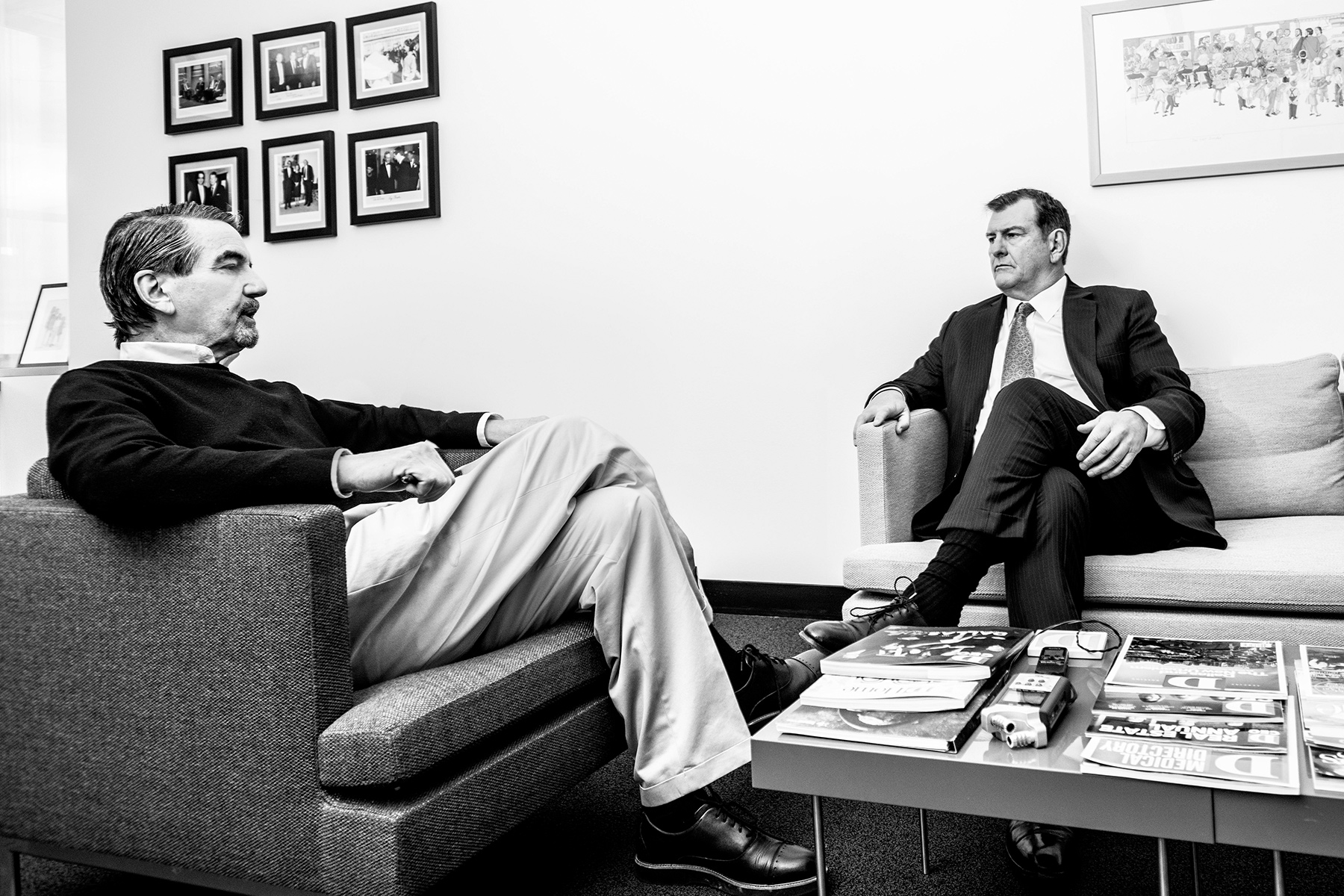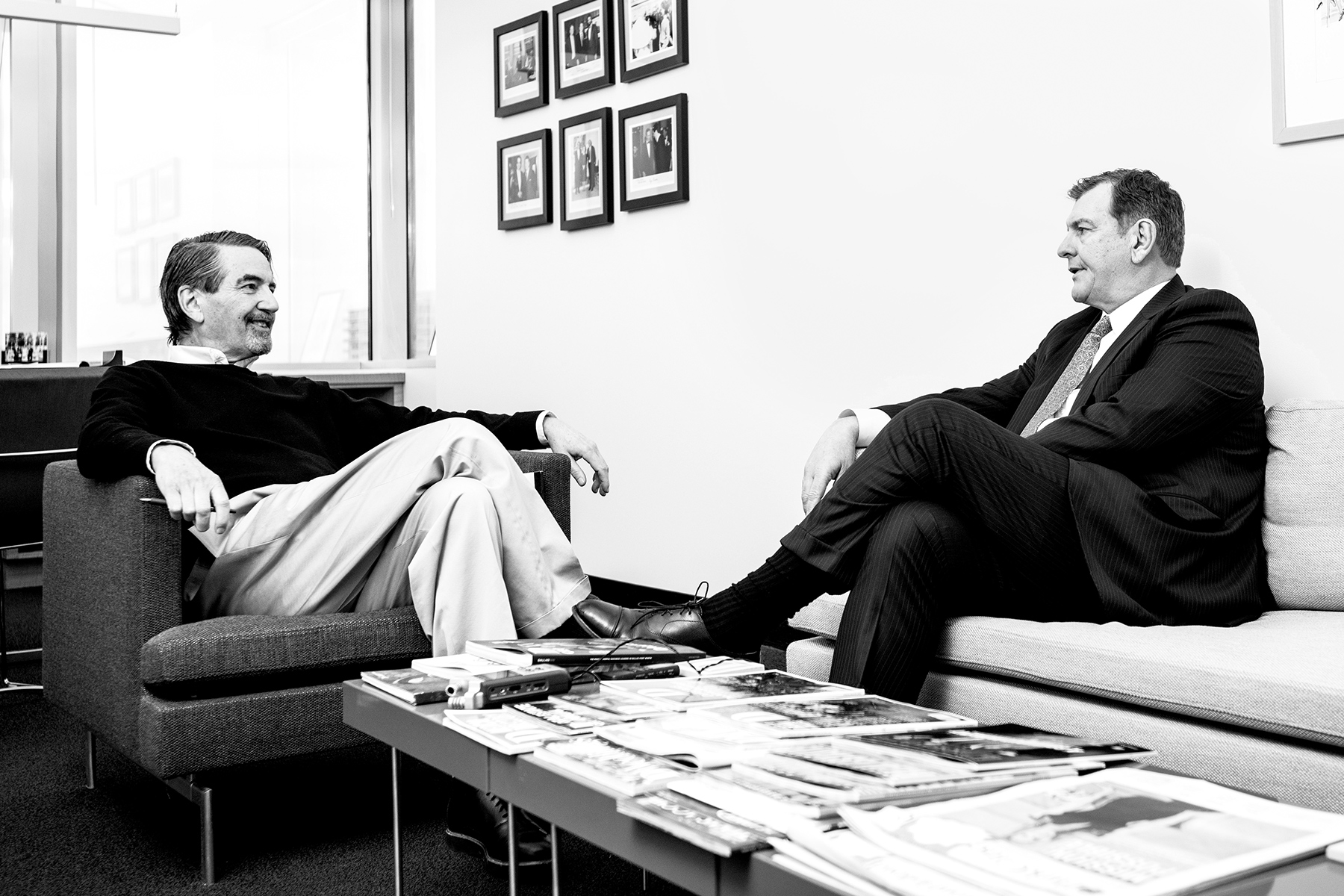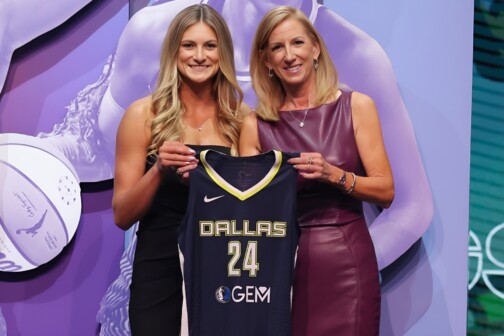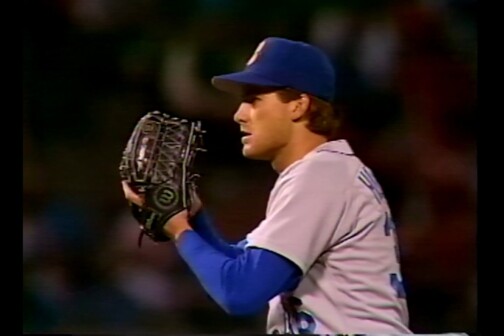Rawlings sat down with D Magazine founder Wick Allison to reflect on his eight years at City Hall, speaking candidly about both his successes and failures—and what he believes the next mayor of Dallas needs to make his or her top priority.
Why did you run for mayor?
It was a personal and, in some ways, a spiritual decision. I was in the car with my son, Gunnar, who was in college in 2011, when I received a phone call from somebody that said, “You’ve got to run for mayor.” I said to them, “No, I don’t think so, I’m in a good place in my life.” I knew this was a moment to bond with Gunnar. I’d learned a long time ago that if you ask your child questions, ask something that doesn’t elicit a simple yes or no. I said to him, “Don’t give me advice, but tell me the question I should ask myself to determine whether I should run.” I had earlier given him a book on Marcus Aurelius. He thought for a long time, which is very dangerous, and finally he said, “What would the virtuous man do?” Right there, I knew I was screwed.
The office of mayor in Dallas is a strange creature under the weak mayoral system. The first role that every mayor plays is the civic mayor, the chief of the tribe. The first moment, at least in public, that you stepped forward in that role was with the 50th anniversary of the JFK assassination, in 2013. Nobody was expecting much, frankly. I think you knocked it out of the ballpark. How did it feel stepping up to that role on that day?
I think your premise is right. My wife, Micki, says, “Everybody thinks you’re in charge of everything. They don’t understand that you’re in charge of nothing.”
In regards to my speech, I started thinking about it six months before. It was very intentional. I wanted to keep it short. One day I bumped into Adlene Harrison, who was Dallas’ first Jewish mayor, in 1976, and she said, “Mayor, I know you’re working on what to say on the 50th but you need to hear what Rabbi Levi Olan said on his radio show the week after the assassination.” She took me to the archives at SMU, at the Perkins School of Theology, and I sat down to listen. She had Rabbi Olan’s daughter with her.
They played the rabbi’s sermon from 1963, and I was really in tears. You just felt the moment that the city was breaking apart by what he was saying. I turned to his daughter and said, “I’m going to use this somehow because this puts us in a real place at the real time.” He was such a peacemaker.
The other thing I remember about that speech in 2013 was I was very upset that it was raining and cold that day. But in hindsight, if I was the director, I would’ve made it wet and cold like that. It was right. It was poetic. I’ll always remember talking to Ross Perot Sr., who brought the Navy Glee Club down. He paid for it, and he called me up the night before. He said, “Mayor, it’s going to rain tomorrow. That choir can’t be sitting in the rain. We’ve got to move it inside.” I said, “Mr. Perot, that’s not what we’re planning, but since you were a major contributor to this, we will take that under consideration.” We got everybody back together. We all just said, “If it rains, it rains. We’re just going to have to power through it.” He wasn’t real happy with me at that point, but he was great.
Another noteworthy moment of your tenure came in July 2016, with the shootings in downtown Dallas. How did that news first come to you?
It had been a busy year, and I was a bit tired. We had not gotten to have Christmas with my family, who lives in Kansas. We went up to Colorado to have a Christmas in July. We were up there, and my mother-in-law, who’d lived with us for a decade and was pretty elderly and sick, was staying with a caregiver—she passed away while we were up there. It was very upsetting to my wife. She and I jumped on a plane the next morning, got back, and got her funeral together. It’s out in East Texas, this little church out there. We drove back on that Thursday. We got home and finally we were able to decompress.
That’s when my assistant called me and said, “Turn on the TV.” So I watched it and immediately called Chief David Brown, and the action started. I got to City Hall, went to the emergency center, and got a briefing from him. We started making calls. When I say calls, not phone calls, but decisions were being made. There were assistants of City Council people in the emergency room. It was kind of hectic, but we corralled all the City Council that wanted to be up there. There were only about four or five at that time there. We kept them in the room. I got the update, and then went back and told them. It was really interesting because a couple were African-American in that group, but Tiffinni Young was one of them. I said, “Before I go out there and talk, I should listen to the Council about what they want me to say.” Everybody was quiet except for Tiffinni. Tiffinni said, “We got to come together as a city at this point. This should not be a racial thing.” I just got so much confidence listening to her.
Then, at one point, I asked the Council to keep our plan confidential. Of course, they didn’t. It was Philip Kingston or Scott Griggs. Usually those are the ones tweeting. I forget exactly who that was. I remember we had to clean up a little, correct some things that were said at that point. It’s unfair of me to quote exactly what was said, but it really—when you’re elected, there should be a cone of silence on emergencies and decisions that impact the city fiscally. That’s just not the way people act in this last eight years. They believe anything that’s said can be communicated to everybody. It’s a different philosophy, and it really upset me at times, this whole thing.
You and I had lunch in February 2014. You had been mayor for three years. You made a statement that startled me. You said, “I eschew politics. I don’t like it. I’m not a politician. I’m not going to do it.” The reason that startled me is the mayor is not just the civic leader, he is the city’s political leader. Now that you have the benefit of some hindsight, what do you think about that?
It gets into the issue of how you govern in a city manager form of government. That’s what I didn’t have a good sense about and probably learned the most about. I think unless you’ve been a City Council member, you probably don’t understand that well. Because not only is this about politics, it’s about process as well, and where the decisions are. When you face tough decisions, do you make them a big deal early in the process or do you keep your cards close until playing at the end? There’s the timing of the poker game, and that was a challenge to me.
One instance where I get criticized was in 2014 when A.C. Gonzalez was named city manager. I wasn’t supportive, but I did not go all out to get my preferred candidate selected. The theory is that I could have traded votes with two Council members to win—Sheffie Kadane and Jerry Allen. The price, though, was I would have had to keep them on the pension fund board. I can see how people would want that kind of mayor, somebody who can make deals. However, I felt I had to get them off the board because I knew that pension fund was in dire straits. It’s a fair criticism that I let A.C. get selected, even though I did not feel he was the best candidate. I’m not a vote trader. I may be the person that says, “Here’s the issue. How does everybody feel about it?”
It comes back to the form of government, too. I mean, I know this is something you and I have talked about, but there are some real shortcomings with it.
“I look forward to the days when it will be socially acceptable for me to engage in some good old-fashioned day drinking.”
Let’s just try to plumb those shortcomings because it’s essential for people in selecting their new mayor to understand what kind of skills are really needed. One of the frustrations of many mayors before you is that they come in thinking they are now the CEO. But the mayor is not the CEO; the city manager is the CEO.
I realized early on that my role was chairman of the board or lead director. I needed to understand what the role is. It is coalescing a group of people toward a direction, trying to get them in the right place and coaching the CEO. It’s frustrating at times because you want to reach beyond the CEO and say that person is no good or we should hire this person, but the role does not allow that.
To me it’s all about people. I mean, we can talk about organization, but this whole story of my last eight years has been about people. In fact, that’s why I got active in the home rule thing with Dallas ISD, the idea in 2014 to change the district’s charter and bring it under city residents’ oversight.
You met privately with a group of people, including Mike Morath, then a DISD trustee who is now Texas education commissioner, and announced a charter revision. It blew up in your face.
I’ll tell the story slightly differently, and the result was a success. I first made an impact by strongly suggesting Mike Miles should be chosen as the new superintendent, and the school board concurred. I got his name from Arne Duncan [then U.S. secretary of education]. Mike comes in and breaks some china on the shelf. Some people haven’t forgiven me for that. I’m not saying Mike was perfect. I am saying the only way you’re going to change this trajectory is to be a change agent. I studied the state law on home rule, and I studied the logic of home rule. It provides a lot more flexibility than when a district is stuck having to follow statewide regulations. I felt the state was holding us back.
I was told at that point that I had a majority of the trustees with me if I led this effort. That was not true. But I came to realize it was not true before I announced my support. I decided to go ahead anyway. I think it’s the most important thing I did as mayor. What DISD has accomplished in teacher accountability, in allowing principals to hire their own folks, and in paying for performance resulted directly from the home rule fight.
But it was a clumsy political effort. If we had just spent two or three or four months on town hall meetings and in galvanizing public support, we undoubtedly would have won. It was a failure, but it was a failure that produced lasting results. It’s the thing I’m most proud of as mayor because it was the hardest thing for me politically.
There was a meeting with Hispanic leaders in 2014 about home rule where you walked out and it became a big deal. The political campaign operator Anna Casey got your goat, and you walked out.
She didn’t get my goat. I was disappointed in that group because I thought they wanted to have a real conversation, and they just wanted to be confrontational.
I went around. I knew that people were upset. I went to African-American communities, preachers, unions, teachers, East Dallas folks. One of them was a group of Latinos and I thought it was going to be five people. I show up and they had invited the world, including Philip Kingston and Adam Medrano. Anna was the person that was, I guess, assigned to poke the bear. I had just said politely, “Guys, are we gonna have a conversation about this or a big argument? I’m here trying to be respectful and listen.” Anna started again. I just walked away. My mama taught me a long time ago not to hang out in places I’m gonna get in trouble, and this was one of those places. So I just left.
That seems to be her style, Anna Casey. She’s still running the show with a group of Council members and candidates—Kingston, Medrano, Scott Griggs. What do you think will happen to the city if that group is able to consolidate its power?
I think we’ll be a divisive city. There’s no question. That is what they are intending to do, is to divide the city. When you have people that get elected that have a mission in mind, they will divide the city. What did Philip say on his Facebook? The real progressives and the creeps? Anybody that disagrees with them are creeps. You’re gonna have a tone that they’ve been very clear that they want to have, a tone that I felt [Councilman] Mark Clayton was uncomfortable with. He’s a nice guy. I think Dallas is a nice city, but people believe that we’ve got a lot of bad people that need to be taken down. I don’t see the city that way.
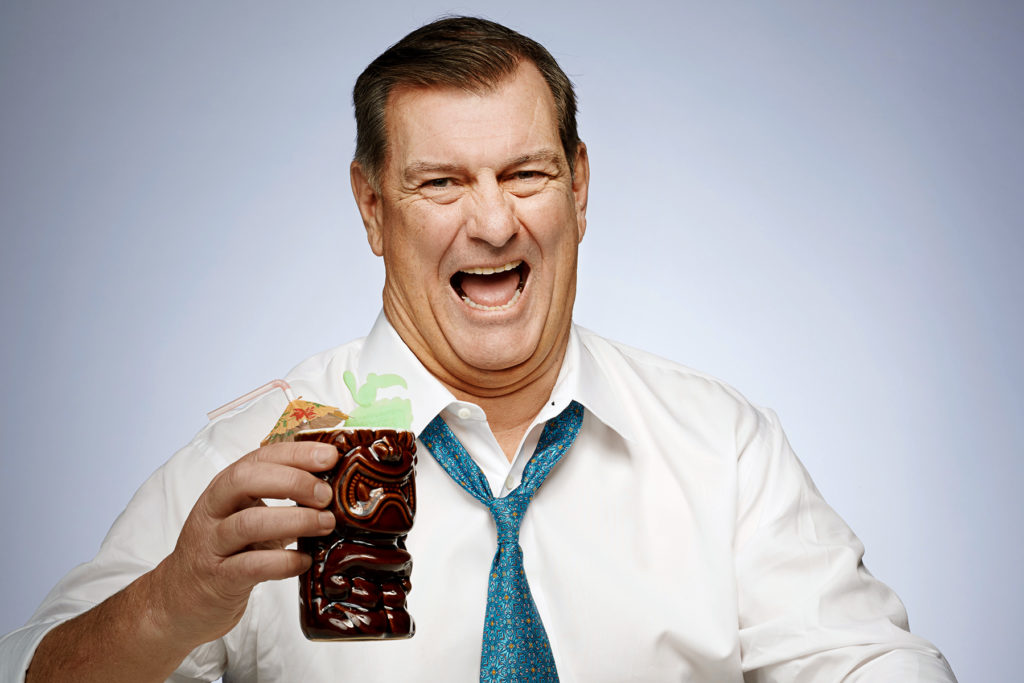
In the same year, 2014, you announced a task force on Fair Park to begin the process of privatizing its management under the direction of Walt Humann. But the process got snarled up a bit. Later on, the new city attorney, Larry Casto, ruled that a full-blown “request for proposal” process was needed. I recall your being very frustrated by that.
I did not get frustrated at the ruling, but I was frustrated at the timing. We were so far down the road. I felt that some Council members were trying to delay things. I mean, if you just play four-corner offense at the city and do it well enough, you don’t accomplish anything. I like to get things done, even if I don’t have enough leverage sometimes to pull them off. We have a great partnership now. I also was concerned about this mission against the State Fair Association. You’ve been anti-State Fair over the years, and I think that was a little unfair.
Let me clarify that. I think the State Fair is an opaque organization that, like many siloed semi-government organizations in this city, leads to corruption. When it comes to the State Fair and Fair Park, the city’s duty is to protect its No. 1 asset.
When I started seeing this bubble up, I went to the city attorney. I asked, “Is the State Fair doing something illegal or something untoward that the city should not be supporting?” He went off and came back and said no. Then I went to the city auditor and said, “I want you to go through every big organization we give money to, OK, and audit them. The first one I want to be on that list is the State Fair.” That’s how we did it. We ended up with Fair Park First as the nonprofit and Spectra as the operator. I actually started this project when I was president of the Park Board, before I ran for mayor, because Fair Park was badly managed. One of the things I’ve checked off is that we’ve gotten to a better place in the years I’ve devoted to Fair Park.
Give us a report on GrowSouth.
I had a coach once who said, “Just show me the win-loss column.” Southern Dallas grew for many of the years I was in office, faster than North Dallas. Land values have increased 50 percent. Crime is down, schools are generally better, more neighborhood associations have been created, and there are more support services and retail.
Most important, I think it is on the top of everybody’s agenda now. The issue when I came into office was, what are we going to do with those poor people down there? In my mind, that was the wrong attitude. My attitude was, how do we unleash this asset? It’s huge. Fifty-five percent of our land. You can fit Atlanta inside of it. You can fit Denver and Seattle both inside of it. There’s no more beautiful part of this city. But it had been seen for decades as the other side of the tracks. I tried to wake people up to its potential. The biggest change is that now investors are starting to see that potential.
That’s the good news. The bad news is that it is a very big and very complex place. You can’t paint it with one brush. As I’ve described it, it’s almost a city unto itself, and like any city it’s got its strengths and weaknesses. There are major areas that have not made progress. Lancaster Road is one of them. We’ve made some progress around Fair Park and South Dallas, but the deep part of southern Dallas proper still is not what it should be.
It lost 50,000 people over the past 30 years.
I would not call it a thriving place. But there is activity, and there is investment, like in the Cedars. There is some hope now. When I go into southern Dallas and I talk to people, there’s a sense things are happening. They may be small things, like getting a Walmart. But it’s one of their most successful stores. We got the Red Bird transaction done, the activity around Executive Airport.
That’s kind of my short view of GrowSouth. By the way, it’s going to need this mayor, the next mayor, and probably the next mayor to continue focusing on southern Dallas. Let me get a step further. We have to attack poverty head on. If the mayor can’t even hire the city attorney or auditor by himself, how is he going to attack poverty? In the last couple of years, I’ve realized that you’ve got to leverage economic development and you have to break down the silos governmentally here in the city to attack poverty holistically, using every weapon in our arsenal. That’s why we’ve created the Child Poverty Action Lab.
That you created yourself? And funded privately?
That was my secret weapon.
So that is another role of the mayor in a weak mayoral system: instigator and fundraiser.
I realize I couldn’t get anything done fast enough at City Hall, but I could when I raised the money outside. Citizens want the city to change, and their generosity in funding these initiatives has been remarkable. We raised a $35 million private equity fund for southern Dallas. The $50 million donation for the Harold Simmons Park is an example of what got the Trinity River project going. You can get stuff done in a city, but sometimes it’s not at City Hall.
Let’s talk silos. In examining how the city works, these silos are extremely important: DART, the Dallas Housing Authority, DISD, the State Fair Association, VisitDallas, the unlamented Dallas County Schools. In most of the cases, they are under the direct control or indirect control of the City Council. For example, the DART board, where Dallas has eight of the 15 votes. I wouldn’t call them strong levers, but they are definitely levers and they have been mostly unused. The city for 40 years has just left these organizations to pursue their own agendas.
True.
“I went to the city auditor and said, ‘I want you to go through every big organization we give money to, OK, and audit them. The first one I want to be on that list is the State Fair.’ ”
Many of which are more for the benefit of the management of the organizations than for the good of the city.
At times.
I think that’s a crucial issue when you talk about GrowSouth and how you started to realize that you need to galvanize these agencies to address poverty. When these things are controlled by somebody else, it makes it imperative that the city take control or exercise its leadership.
First, any mayor has to play to win in the game the way the game has been set up. You might want to change the rules of the game, but right now we’re playing a card game and these are the rules, and you’ve got to play the hand that’s dealt you. And that’s how I approached the job. The second thing is, the job of the mayor has got to be helping those organizations in City Hall get alignment around an agenda. That is the most important thing. When you get back to policy and politics, when you get politics messing with policy, it is very difficult to do that.
Politics is the means to implement policy. For example, wielding a majority to replace board members.
But then it gets personal. When people attack other people in organizations, and you’re trying to get them aligned, then you have a schism. That’s why I think at the city level, minimizing the personal politics helps us accomplish what you’re trying to accomplish. To me, that’s key in setting these agendas. The job of the mayor is to try to pull a consensus agenda to influence those organizations.
I’m with you on your logic, and we’ve got to be more proactive about that. I’ve spent a lot of time with the DART leadership to talk about its problems. It’s more difficult since I’m not on that board. Whereas, as mayor, I am on the DFW Airport board, so I cannot be ignored. So one way you could do it is to have the mayor sit on these boards.
Let’s talk about regionalism. You, early on, proclaimed yourself the mayor of DFW.
I didn’t proclaim myself as the mayor. I did say we live in a city called DFW and we’ve got a neighborhood called Dallas.
On the one hand, regionalism has been a huge success in creating wealth for millions of people in this region, starting with DFW Airport. On the other hand, regionalism has not been so good in recent years for the city of Dallas, which has become the hole in the doughnut. The median household income in Frisco is $117,000, and the median household income in Plano is $88,000. So they are doing fine. Since when you were elected mayor until today, the median household income in Dallas has been stuck at $47,000. We’ve made no progress in creating prosperity for our own citizens and taxpayers. Is it time for Dallas to drop this regionalism concept and start concentrating on its own economic future?
Make Dallas great again?
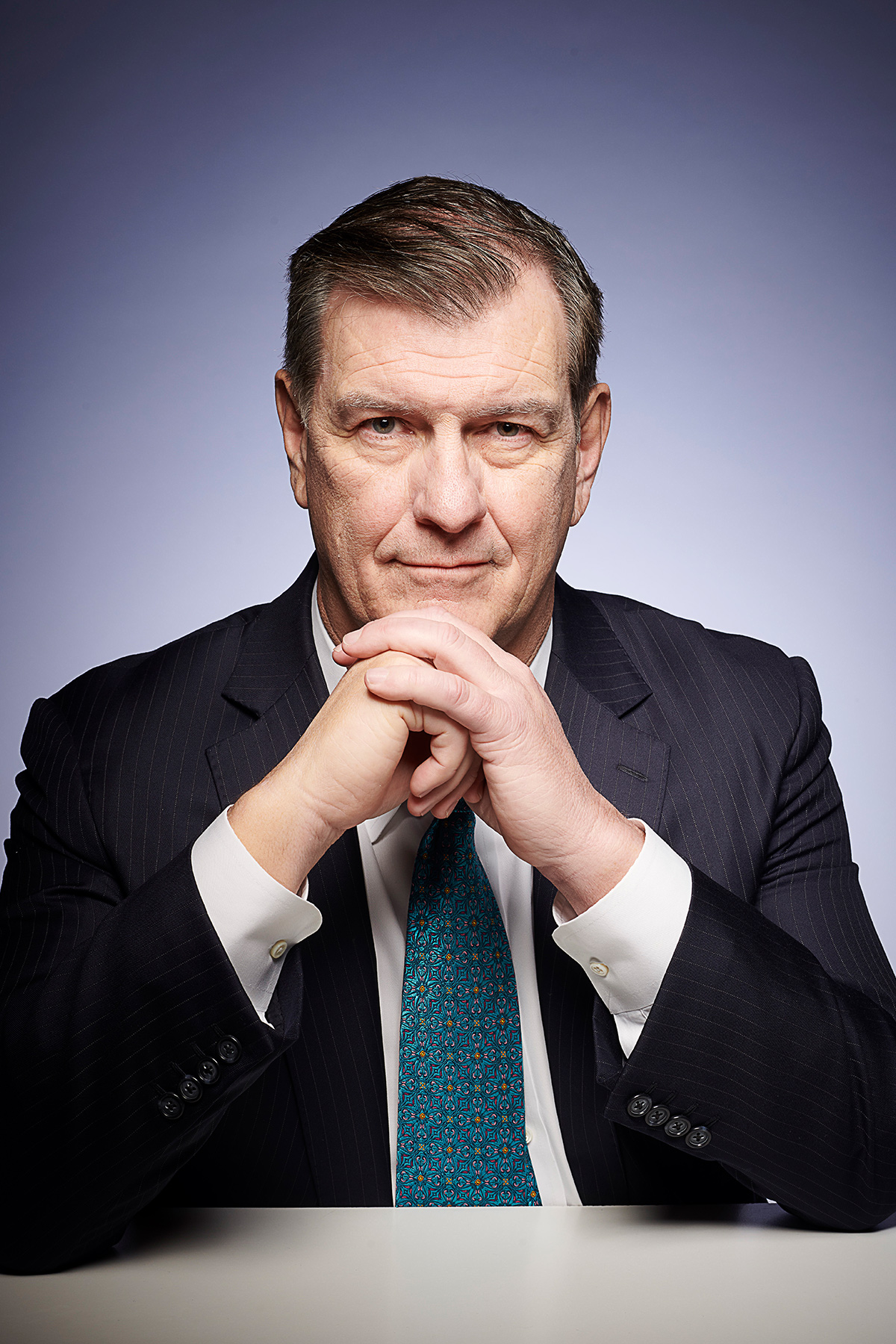
Is there something wrong with making Dallas great again?
I think Dallas is already great.
The second thing that startled me at our lunch five years ago is that I brought up some of these issues, and you said, “Dallas is doing fine. Look around you.” Would you say that today?
Dallas is doing fine. Look around you. Let’s just look at our property values. We have never grown this fast on this big a base in the history of the city of Dallas. To grow at a 50 percent clip on an $80 billion base, you would be the highest-returning stock on the Dow Jones. So in that regard, I think we’ve been doing great. But I want to get to the core issue of how Dallas competes in the world and against the suburbs.
I have two points on this. First, the world doesn’t know where the city of Dallas boundaries start and stop. I always go back to the customers. They don’t understand these jurisdictions. Second, Dallas plays a unique role that we spend very little time talking about. Seventy-five percent of the population in the city of Dallas every day commutes in for jobs. Only one in four jobs in Dallas are held by people who live in the city of Dallas.
That’s a terrible statistic.
I wasn’t saying it was good or bad. This is what’s happened over the last 50 years. Next to New York City, Dallas has the highest percentage of commuters coming in daily for work. Those are the cards we are dealt. On the other hand, we also produce a lot of jobs, and a lot of people move here for those jobs, but they are less well off than the suburbanites who commute. We need a tremendous amount of housing for people wanting to live here. There is some sort of belief that we need to be Frisco and Plano, and I disavow that. I think we can be a diverse, economically vibrant city. We’ve proven that.
To your point, I cannot remember a policy that I consciously made to defer to my surrounding cities that was to the detriment of the city of Dallas. I think my job is to compete tooth and nail with these folks around town. But I’m also a cooperator, and I’m going to try to get my things done at DART, get my issues taken care of from a regional transportation perspective, and work with Fort Worth’s mayor, Betsy Price, at DFW Airport. That’s my belief structure.
When you were elected in 2011, you were supportive of the Trinity tollway, and you in fact got even stronger in your support while in office. Why?
There are some issues that are put in your lap that don’t pull the city together, and you wish they would go away. The tollway was used as a wedge issue very effectively with the idea that the establishment wants to pour concrete and we folks don’t want green space. That being said, I think I probably took a left turn on the parkway once I saw the final drawings. I was a proponent for transportation reasons and mobility reasons and connectivity reasons.
What mobility reasons and what transportation reasons?
The question of the connectivity of southern Dallas to jobs.
Using a tollway?
Using the parkway, yes.
It was a tollway.
When I started on the thing, it was quickly apparent the North Texas Tollway Authority wasn’t going to spend a penny on it, so it wasn’t going to be a tollway. That was one of the realities I faced. I told people that I would not support what had been designed up to this point.
Which people did you tell?
Mary Suhm, the city manager.
But you didn’t publicly announce your change of heart.
No, I just don’t do all that stuff, OK? The reason I announced the Dream Team architectural review was because I didn’t agree with the way the parkway had been changed into a highway.
But you realize because you didn’t announce that you had changed your position, the Dream Team was seen by people who were opponents of the tollway as a camouflage for finding a new way to try to sell it.
I understand all of that, and, by the way, I actually did say that I was against the current design and that’s why we needed to have something else, but they didn’t listen. This was a wedge issue. This was a political issue.
“A mayor needs to be a uniter, unlike Trump, who’s a divider. The president should be a uniter. A mayor should be a uniter. A governor should be a uniter.”
I don’t recall your announcing that in public.
In my speech down in Trinity Groves, I said, “Look, we’re not going to do this as presently designed. It’s got to be something that’s been in keeping with a great park.” We encouraged the Dream Team to work with folks that were anti-tollway, and then I went in the final days to people on both sides and said, “Is there something that would work?” I tried to pull folks together.
Meanwhile, back at the ranch, I’m realizing the funding of this thing is drying up and even if we were able to get to a compromise, it was irrelevant because there was no money that was going to pay for a parkway or a tollway. So either way it’s dead. Let’s move on, but I don’t disavow my support of trying to wrestle through the issue of mobility in the city, and we need to continue to do it. What I did do was try to focus on what we were all aligned around and that was the green space.
I bring this up because we live in populist times. During the fight over the tollway, there was a growing disconnect as the public developed a deeply felt suspicion of the motivations of the leadership of the city.
And me.
That brings us to a question of factionalism. That divide found expression on the City Council. Do you think it perhaps contributed to some of the antagonism that grew up between you and some of your colleagues?
No question. And, as I said, it was grabbed as a wedge issue. It was like the Wall or something that becomes much bigger in mythic proportions. I understood different people’s thoughts on all of this, and how that happened and amongst the type of people it happened to and their disenfranchisement, and how things allegedly happened because of the establishment. I never understood the questioning of motives, this notion that there was some deeper motivation going on.
You can say people are wrong and they’re stubborn because they want to be right all the time. I understand that. I didn’t understand the theory that somehow the fat cats were going to continue to rape the city through the tollway. I thought that was ill-founded, but the belief that we don’t want to be building highways, and we want to do green space, I understand. Let’s just talk about that. So even with the road dead, we have a way to create a new park. I had four votes against that. So it’s not the policy. It’s the politics about that, because power sometimes comes from creating enemies.
What would be the top things that you would warn your successor about?
I’d warn them to make sure they’re very intentional in their communication. It helped me a lot when I realized that I might make a remark and it is taken the wrong way or misinterpreted. So making sure that you are a very intentional communicator is very important.
Another thing is to warn people not to look at the next job, because if you do that as mayor of the city of Dallas—if you make decisions weighing on a future primary or election—you’re not making them for the right reason. And, ultimately, that’s going to hurt you. I mean, it did hurt Tom Leppert.
Next, I would warn them about burning bridges from a personal standpoint. There are people that have stabbed me in the back many times. Like any normal human being, I was not happy, and I was tempted to retaliate. But that would only make things worse. I’m always upfront with those people. If they say one thing to me and do something else, I respect them enough to personally interact with them about that. There’s some people that I know I’m never going to get there. I mean, I tried with some Council members and it just was a joke—it wasn’t going to happen.
The most important warning: don’t harden yourself. Stay nice. You only have one life. This has been hard for me.
The weekly business of the City Council is very time-consuming. Members receive a thousand pages of information every week on the issues coming before them. How would you advise the next mayor to keep his or her eyes on strategy and not get overwhelmed by the avalanche that will hit him?
It’s got to start with a personal quiet time. They need to have a very clear strategy that they believe in. I think you’ll see it in the mayoral debate because people will want to get into a lot of minor details and the nuances of policy. You have to be clear-headed on what you want to achieve. If you’re waiting for the strategy to come to you, it’s probably not going to work out. For me, I believed in a couple of big things.
One was that Dallas was a place that could be a major player in America and the world. I believed in the bigness of the future of Dallas. As I looked at different issues, I looked at it through that lens.
The second was southern Dallas. Whenever there was a tie, I was always going to go with southern Dallas. That’s knowing myself. I’m not saying that everybody’s got to do that. It just was easier to view things through those two lenses.
The third thing I would advise him or her to do is to know whom to trust and whom to surround yourself with. I’ve been very fortunate in my staff. Their grasp of a lot of the details and the nuances of things is critical for me. I’ve got this phrase: “We’ll jump off that bridge when we get to it.” Let’s not try to attack every little issue. If you have a clear strategy, and you surround yourself with the right people, and you don’t have to feel like you’ve got to get a hundred on every test, it helps.
Lastly, to work harder than the next guy. I mean, you’ve got to work hard.
If the next mayor isn’t Scott Griggs, what’s your advice for that mayor on how to handle Philip Kingston?
I’d give that advice to Scott, too. Look, let’s just come back to what a mayor needs to do. A mayor needs to be a uniter, unlike Trump, who’s a divider. The president should be a uniter. A mayor should be a uniter. A governor should be a uniter. That’s the way you deal with that job, and I think that’s the way you deal with all the constituents around the City Council. Some are more difficult to unite, but you’ve got to keep that as your North Star.


